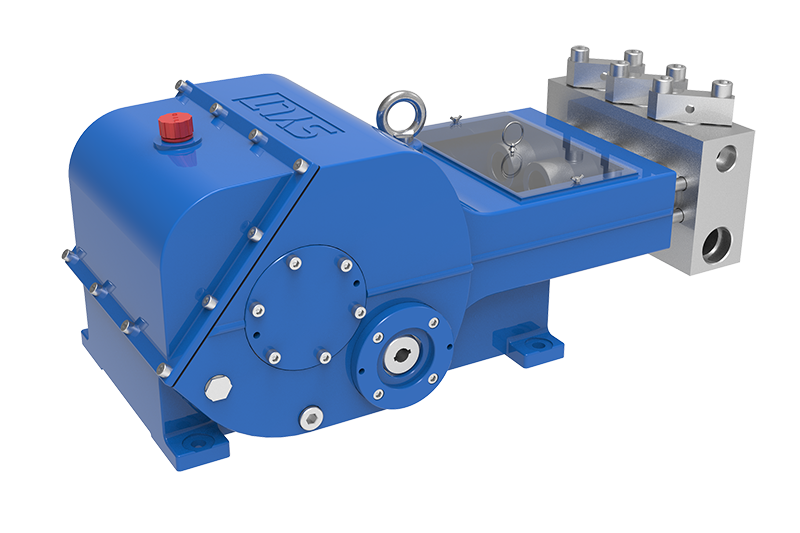Maximizing Performance: Why Advanced High Pressure Pumps Are Essential for Your Operations
Table of Contents
- Introduction to High Pressure Pumps
- The Importance of High Pressure Pumps in Industrial Operations
- Advantages of Advanced High Pressure Pumps
- Applications of High Pressure Pumps in Various Industries
- Key Technical Features to Consider
- Maintenance and Reliability of High Pressure Pumps
- How to Select the Right High Pressure Pump for Your Needs
- The Future of High Pressure Pump Technology
- Conclusion
- FAQs about High Pressure Pumps
Introduction to High Pressure Pumps
High pressure pumps are vital components in various industrial processes. They are designed to move fluids at high pressures, ensuring efficient operation across numerous applications. The demand for advanced high pressure pumps has surged as industries seek to maximize productivity and minimize operational costs. Understanding the importance of these pumps is crucial for businesses looking to enhance performance and efficiency.
The Importance of High Pressure Pumps in Industrial Operations
The role of high pressure pumps in industrial operations cannot be overstated. They are essential for tasks such as:
- **Fluid Transfer**: High pressure pumps enable efficient fluid transfer, reducing downtime and improving throughput.
- **Enhanced Performance**: By operating at high pressures, these pumps facilitate better performance in processes like cleaning, mixing, and spraying.
- **Versatility**: High pressure pumps cater to a wide range of fluids, including corrosive substances, slurries, and viscous materials, making them suitable for various industries.
Investing in advanced high pressure pumps can lead to significant improvements in operational efficiency, lower maintenance costs, and extended equipment lifespan.
Advantages of Advanced High Pressure Pumps
Advanced high pressure pumps come with a myriad of advantages that make them indispensable for industrial applications. Some of the key benefits include:
1. Increased Efficiency
Modern high pressure pumps are designed to maximize fluid flow with minimal energy consumption. This efficiency not only lowers operational costs but also reduces the carbon footprint of industrial processes.
2. Precision Control
Many advanced models offer precise control over flow rates and pressure outputs, allowing for tailor-made solutions to specific operational needs. This level of control is crucial in applications where consistency and precision are paramount.
3. Durability and Reliability
High-quality materials and innovative engineering ensure that advanced high pressure pumps are built to last. They can withstand harsh operating environments and are less prone to failure, which translates to lower maintenance costs and less downtime.
4. Enhanced Safety Features
Safety is a critical concern in any industrial setting. Advanced high pressure pumps often come equipped with safety mechanisms designed to prevent over-pressurization and fluid spills, ensuring a safer work environment.
5. Customization Options
The ability to customize pumps for specific applications is a significant advantage. Whether it’s adjusting the pump's configuration for a unique fluid or adding features for extreme conditions, advanced high pressure pumps can be tailored to meet diverse needs.
Applications of High Pressure Pumps in Various Industries
High pressure pumps are utilized across a broad spectrum of industries, each with unique applications:
1. Oil and Gas Industry
In the oil and gas sector, high pressure pumps are instrumental in the extraction and transportation of crude oil and natural gas. They are also used in hydraulic fracturing to enhance recovery rates.
2. Water Treatment Facilities
High pressure pumps play a vital role in water treatment processes, including reverse osmosis and filtration, which require high flow rates and pressures to ensure clean, safe drinking water.
3. Chemical Processing
In chemical manufacturing, these pumps facilitate the safe and efficient transfer of hazardous and non-hazardous liquids, ensuring that processes run smoothly without contamination or loss.
4. Food and Beverage Industry
High pressure pumps are used for various applications in the food and beverage sector, including pasteurization and homogenization, where maintaining high pressure is essential for product quality.
5. Pharmaceutical Manufacturing
Precision and cleanliness are critical in pharmaceutical applications. High pressure pumps enable sterile processing, ensuring that products are manufactured under the highest hygienic standards.
Key Technical Features to Consider
When selecting advanced high pressure pumps, there are several crucial technical features to consider:
1. Pressure Rating
Understanding the pressure rating is essential for ensuring the pump meets operational demands. High pressure pumps are available in various ratings, so selecting one that aligns with your specific application is vital.
2. Flow Rate
The required flow rate will determine the size and type of pump needed. High pressure pumps can deliver a wide range of flow rates, so it's important to choose one that matches your requirements.
3. Material Compatibility
The pump materials must be compatible with the fluids being pumped. Corrosive or abrasive fluids may require pumps made from specialized materials to prevent premature wear and failure.
4. Energy Efficiency
With rising energy costs, selecting an energy-efficient pump can significantly reduce operational expenses. Look for pumps with advanced designs that optimize energy consumption.
5. Maintenance Access
Ease of maintenance is a crucial consideration. Pumps that allow for easy access to components can reduce downtime and maintenance costs, ensuring that operations run smoothly.
Maintenance and Reliability of High Pressure Pumps
Proper maintenance is key to ensuring the longevity and reliability of high pressure pumps. Implementing a regular maintenance schedule can help identify potential issues before they become significant problems.
1. Routine Inspections
Conducting routine inspections of the pump and its components can help detect wear or damage early on. Checking seals, bearings, and mechanical parts is essential for preventing unexpected failures.
2. Lubrication
Proper lubrication of moving parts is critical for reducing friction and wear. Ensuring that pumps are adequately lubricated can significantly extend their lifespan.
3. Monitoring Performance
Using sensors to monitor pressure, flow rate, and temperature can provide valuable insights into pump performance. Real-time data can alert operators to potential issues before they escalate.
4. Cleaning and Flushing
Regular cleaning and flushing of the system can prevent buildup and contamination, which can impair pump function and lead to costly repairs.
How to Select the Right High Pressure Pump for Your Needs
Selecting the right high pressure pump involves several considerations:
1. Assess Your Requirements
Begin by assessing your specific operational requirements. Consider factors such as the type of fluid, required flow rate, and operating pressure.
2. Research Available Options
Research various pump models and their specifications. Look for reputable manufacturers with proven track records in quality and reliability.
3. Consult with Experts
Consulting with industry experts can provide valuable insights into the best pump options for your unique application. Their expertise can guide you toward making informed decisions.
4. Evaluate Cost versus Performance
While it may be tempting to choose the cheapest option, evaluating the long-term performance and cost-effectiveness of the pump is crucial. Investing in a high-quality, reliable pump can pay off in the long run.
5. Consider Future Needs
Think about potential future needs as well. Selecting a pump that can adapt to changing requirements or increased demands can save you time and money in the future.
The Future of High Pressure Pump Technology
The landscape of high pressure pump technology is rapidly evolving. Key trends shaping the future include:
1. Automation and IoT Integration
The integration of automation and the Internet of Things (IoT) into high pressure pumps is becoming increasingly common. This technology allows for remote monitoring and control, enhancing efficiency and reducing human error.
2. Sustainability Initiatives
As industries shift toward sustainability, high pressure pumps are being designed with eco-friendly features, such as energy-efficient motors and recyclable materials, aligning with global sustainability goals.
3. Advanced Materials
The development of advanced materials, such as composites and specialty alloys, is improving the performance and lifespan of high pressure pumps, making them more resilient to extreme conditions.
4. Smart Sensors and Data Analytics
The incorporation of smart sensors and data analytics into pump systems enables operators to gather real-time data, facilitating predictive maintenance and operational optimization.
5. Enhanced Safety Features
As safety regulations become more stringent, manufacturers are focusing on developing pumps with enhanced safety features to minimize risks associated with high-pressure operations.
Conclusion
Advanced high pressure pumps are essential for maximizing performance across various industrial sectors. Their ability to deliver high efficiency, precision control, and enhanced durability makes them invaluable in today's competitive landscape. By understanding their advantages, applications, and maintenance needs, businesses can make informed decisions when investing in high pressure pump technology. As the industry evolves, staying abreast of developments in pump technology will empower organizations to continuously optimize their operations and achieve long-term success.
FAQs about High Pressure Pumps
1. What is a high pressure pump?
A high pressure pump is a device designed to move fluids at elevated pressures, typically used in various industrial applications including oil and gas, water treatment, and chemical processing.
2. How do I determine the right pressure rating for my pump?
The right pressure rating can be determined by assessing your operational requirements, considering the fluid type, flow rate, and specific application needs.
3. What maintenance is required for high pressure pumps?
Regular maintenance involves routine inspections, lubrication, performance monitoring, and cleaning to ensure optimal function and longevity.
4. Can high pressure pumps handle corrosive fluids?
Yes, many advanced high pressure pumps are designed with materials that are resistant to corrosion, making them suitable for handling hazardous and corrosive fluids.
5. What are the benefits of using advanced high pressure pumps over traditional pumps?
Advanced high pressure pumps offer increased efficiency, precision control, enhanced durability, and customization options, making them a superior choice for demanding industrial applications.
The 17th China International Powder Metallurgy and Hard Alloy Exhibition
The 2025 17th China International Powder Metallurgy and Hard Alloy Exhibition from March 10-12, 2025, at the Shanghai World Expo Exhibition and Convention Center, Hall H1, B425. We welcome guests to visit.
"Private custom" product design, reliable and durable finished products
"Private custom" like product design, reliable and durable finished products, professional and timely after-sales service. It is the "three basic concepts" that the company adheres to from the beginning until today ".
Experienced market research team, independent product development concept
We have experienced mature market research team, independent product research and development concept, professional design and manufacturing technology so that the company's products can be adjusted according to the specific requirements of customers timely design







